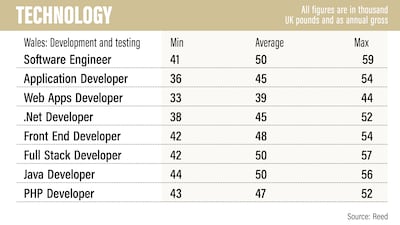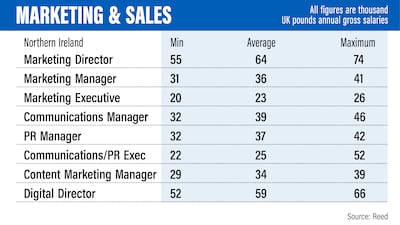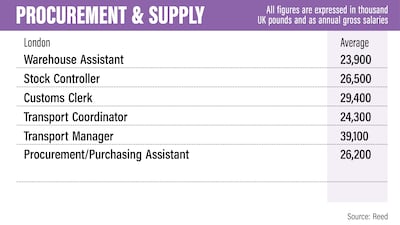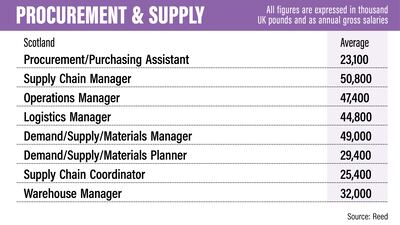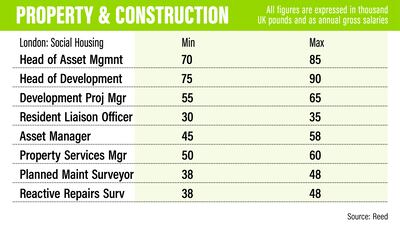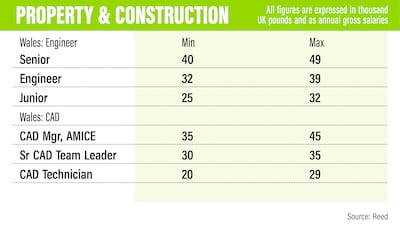Salaries in the UK are lagging behind rising inflation as companies balance a tight employment market and battle for talent against rising costs, according to recruitment specialist Reed.
So far this year, no sector has recorded salary rises that match the cost of living, while some are actually decreasing, says Ian Nicholas, global managing director at Reed.
“It is not surprising that we are seeing a slowdown in the increase in salaries, given the economic uncertainty,” Mr Nicholas says.
“However, we are seeing that the UK’s job market is firmly open, with companies crying out for more candidates to fill their vacancies.”
In April, inflation in the UK reached a 40-year high of 9 per cent, up from 7 per cent in March, the Office for National Statistics said.
The increase in the Consumer Prices Index was the fastest measured rate rise since official records began in 1989 and the highest level since 1982, according to the ONS.
In May, the Bank of England raised interest rates from 0.75 per cent to 1 per cent — a 13-year high — amid concerns that inflation could rise above 10 per cent in 2022.
Employers anticipate an average 3 per cent salary rise for employees in 2022 as they look to combat increasing recruitment and retention difficulties, the UK’s Chartered Institute of Personnel and Development (CIPD), said in its Labour Market Outlook in February.
However, consumer confidence and forecasts of many economic indicators look gloomy despite the labour market remaining in “good health”, the CIPD said in May.
UK salary guide, part two — in pictures
“Every successive forecast to inflation seems to climb a little higher, increasing the gap between wage growth and price growth,” Jonathan Boys, a labour market economist at the CIPD, said at the time.
“For now, regular pay [excluding bonuses] is growing slower than prices are growing. Those who benefit from a bonus are more fortunate. Total pay [including bonuses] is beating inflation and grew by 7 per cent.”
Meanwhile, companies looking to attract talent are advertising stagnating salaries across the UK, according to research by Reed, which analysed more than 9.35 million jobs posted on reed.co.uk since 2018.
“It is clear that advertised salaries are at the same level as pre-pandemic, with any rise over the past two years now back at pre-pandemic levels, despite soaring living costs,” the recruitment company says.
The “Great Resignation” is also a concern for businesses in the UK. However, it could be more of a “Great Flirtation” as businesses are “caught up in an ongoing fight to attract talent among a lack of available jobseekers in the market”, it says.
“Despite claims of the Great Resignation, we are not seeing this translate to increased job applications or candidates and a lack of increase in salaries in job adverts may be why workers feel they are better off staying put,” Mr Nicholas says.
“Businesses looking to recruit right now are facing unique challenges in a candidate-driven market, which is likely why we are seeing variations in salary increases across sectors as companies try to fill their most pressing vacancies.”
As the demand for talent in the UK continues to outpace supply, what is the salary and employment outlook for jobseekers in the UK for the remainder of 2022? Read on to find out and check out our detailed salary guides above for a snapshot of your industry.
Will salaries increase in 2022?
On average, salaries are expected to rise about 3 per cent in the UK in 2022.
However, employees with specialist and technical skills will benefit the most and could receive salary rises as high as 20 per cent, says Simon Winfield, managing director of recruitment company Hays UK and Ireland.
“In the wake of a post-Covid recovery period that has been stronger and quicker than predicted, organisations are facing soaring skills shortages amid a rush to hire talent,” Mr Winfield says in the Hays 2022 Spring Quarterly Update report.
“It is resulting in significant salary growth across many specialist and technical areas — double-digit salary increases in many cases.”
Meanwhile, salary increases will vary between sectors, with some roles such as engineering and manufacturing experiencing a rise of 5.2 per cent, but others including accountancy and finance registering a slight decrease of 1.7 per cent, according to Reed’s Mr Nicholas.
“While we saw advertised salaries increasing in 2020, as government support schemes such as furlough have tapered off, so have the pay rises in many sectors as businesses tackle a difficult, unpredictable economy,” he says.
What benefits can jobseekers expect to be offered?
The UK’s tight labour market means that many employers are struggling to fill roles and are adding new benefits to attract talent, recruitment specialists say.
Benefits and perks are crucial components of an attractive remuneration package and can make all the difference to talent acquisition and retention efforts, according to Robert Half's 2022 Salary Guide.
“Initiatives that were growing in importance prior to the pandemic have accelerated, with many companies adding new offerings or improving existing support,” it says.
The main benefits that are important to employees when considering a new role include having more than 28 days of paid annual leave, health insurance or private medical cover, as well as additional days off for health and well-being, the Hays salary report says.
However, Hays also found that employers continue to be “misaligned” with some of the top benefits that employees value.
“The Covid-19 pandemic impacted the world of work in many ways, including the benefits on offer,” the Hays salary report says.

“Employers put more focus on flexible working arrangement, mental health support and support to enable home working, such as office furniture. These are in line with the top benefits employees want,” Hays says.
“However, there is some mismatch. A third of employees would prefer more support for training and well-being, but only around a quarter of employers have focused more on these.”
It is also important for companies to consider younger employees, who may value different benefits compared with their older colleagues, says Matt Weston, Robert Half's senior district director for the UK, Ireland, the UAE and Benelux countries.
“Recent events have brought about a seismic shift in perks — with many so-called ‘benefits’ now being expected as standard by candidates,” Mr Weston says in the Robert Half salary report.
“Flexible working and well-being initiatives are now essential, but it is important that these do not come at the expense of other perks — especially if you have a lot of younger employees for whom culture is key.”
On the flipside, pay alone will not always attract the best or retain talented people in the long term, says Mr Winfield of Hays.
“Employers must take steps to ensure their full benefits offering is up to scratch, including their flexible working policies, training opportunities and building a culture that promotes purpose and facilitates a good work-life balance.”

What are the most in-demand jobs in the UK in 2022?
Technology and digital roles are dominating the global workforce as workplaces continue to transform their digital strategies — and it is no different in the UK, according to the Hays UK Top Jobs 2022 report.
However, research scientists are also in demand due to huge investments in the biotechnology industry because of the Covid-19 pandemic, it says.
Meanwhile, in the accountancy and finance sector, management accountants and credit controllers are a priority for employers as organisations build greater financial security.
“In construction and property, maintenance and civil engineers will be hot jobs driven by the rapid pace of technology change, a focus on improving sustainability and organisations becoming more ambitious with projects to improve people’s lives,” says Hays.
There has also been “exponential growth” for data analysts over the past few years, with some describing data as the “oil of the 21st century”.
“The rise of AI and machine learning, along with the need to drive data integrity, compliance and digital transformation, make data analysts some of the most valuable members of an organisation,” the report says.
“Demand is high and the supply of skills low — as such, professionals with the right skills can expect to be generously rewarded for their work.”
Other in-demand roles include software engineers, cyber security specialists, digital marketing executives and electrical and civil engineers.
What other skills are employers looking for?
Employers also value soft skills such as communication and an ability to adapt to change, according to Hays.
“While technical skills are significant to succeed in a new role, somebody who possesses great soft skills will often be more desirable compared with those who don’t,” Hays says in its Top Jobs 2022 report.
Problem-solving, an ability to learn, people management and emotional intelligence are also highly sought-after soft skills, it says.
What are the highest paid jobs in the UK?
- Accounting and finance: chief financial officer (London) — £110,000-£189,000 ($139,250-$239,255; gross per year)
- Accounting and finance: chief financial officer (rest of UK) — £95,000-£135,000
- Scientific: biotechnology principal scientist (London & South East) — £52,920-£58,430
- Scientific: pharmaceutical regulatory manager (London & South East) — £59,430-£69,220
- Property and construction: site agent/foreman (London) — £40,000-£58,000
- Property and construction: senior engineer (London) — £50,000-£80,000
- Business support: office manager (London) — £31,300-£48,200
- Business support: executive assistant (London) — £38,500-£47,600
- Technology: chief information officer (London) — £147,290-£226,600
- Technology: head of IT (London) — £90,640-£138,020
- Human resources: chief people officer (London) — £149,570-£198,760
- Human resources: HR director (London) — £108,110-£185,330
- Marketing and sales: marketing director (London) — £75,000-£100,900
- Marketing and sales: digital director (London) — £71,000-£90,300
- Hospitality and leisure: front of house manager (London) — £32,000-£40,000
- Hospitality and leisure: executive chef (London) — £52,000-£66,000
- Social work: director (London & South East) — £95,000-£125,000
- Social work: newly qualified social worker — £28,500-£32,000
Source: Reed Salary Guide 2022









































































